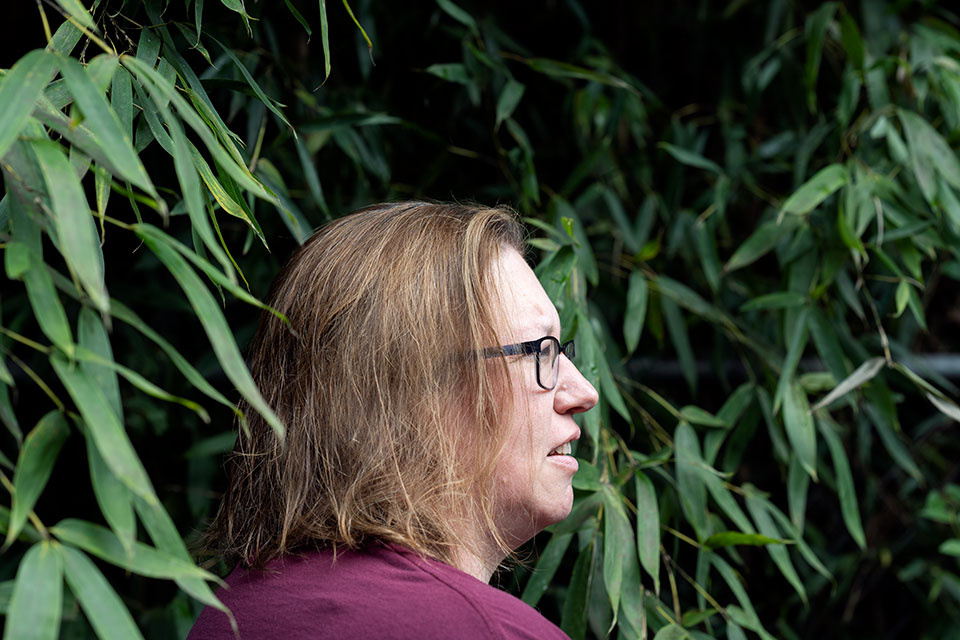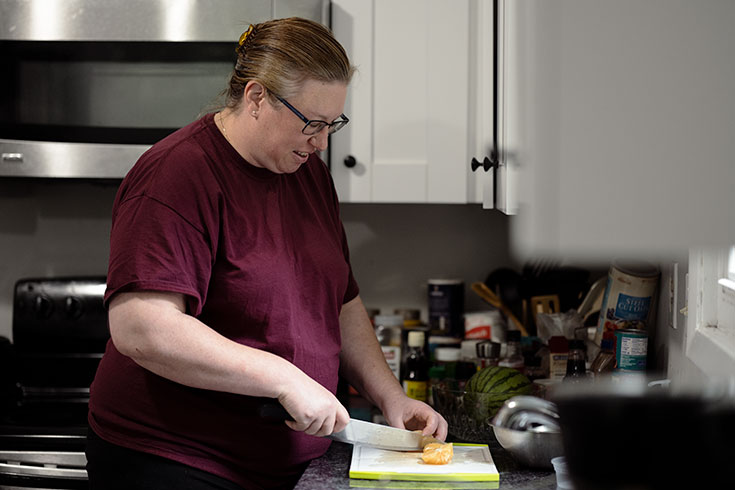Sharon: I'm gonna have to take care of myself, no matter what

Sharon is a 46-year-old white woman who has been working in the restaurant industry since graduating high school. She now lives in Atlanta, supplementing her 40 hour a week position as a cook at a university with a weekend job at a meal delivery service.
Photo Credit: Nydia Blas (all photos)
When Sharon was a young child, her father was laid off from his job as a chef in a fast food restaurant chain. The family, including Sharon, her parents, and her little sister, went to live with her maternal grandmother in Germantown, Pennsylvania. Sharon remembers this as a “tumultuous time,” filled with strife between her mother and father.
When Sharon was ten, her parents divorced. Her mother decided to go back to school to get a degree in nursing and her grandmother, who had always been a big part of their lives, stepped in to take care of Sharon and her sister. As Sharon grew into her teenage years, the caretaking relationship flipped. Sharon found herself spending more and more time tending to her increasingly feeble grandmother.
During her high school years, Sharon faced a series of losses in quick succession. Her grandmother moved to a nursing home where her health deteriorated sharply and she soon passed away. Then Sharon’s father died. Her mother, now working full-time as a nurse, remarried, and Sharon and her sister found themselves living in their stepfather’s home in a well-off suburban neighborhood. There she attended a new high school that offered multiple vocational tracks. She began taking courses in culinary arts and discovered that she shared her father’s interest in food preparation. In her senior year, she applied and was accepted into a prestigious culinary school in New York. Sadly she couldn’t accept the admission offer because of the high cost of tuition, which she was going to have to pay by herself. Her stepfather offered to help but, in exchange, demanded that she submit to his unyielding house rules. She refused. Anxious to get away, she moved out of the house as soon as she graduated and began working in a restaurant chain.
 Sharon exudes an air of responsibility, making it immediately clear that she is a determined person who takes care of business. That unflappable exterior is probably why she got recruited quickly into the management side of restaurant work. As she worked to support herself, she sought out the corporate side of food production rather than moving into high-end fine dining, which is a more volatile business. Corporations that run restaurants often provide security that Sharon finds appealing – health insurance, a retirement account, schedule predictability, and stability. That said, planning menus, cooking, and serving food requires long hours and can be stressful. Despite being robust employers, companies get sold and epidemics can change the business environment – stability is never guaranteed.
Sharon exudes an air of responsibility, making it immediately clear that she is a determined person who takes care of business. That unflappable exterior is probably why she got recruited quickly into the management side of restaurant work. As she worked to support herself, she sought out the corporate side of food production rather than moving into high-end fine dining, which is a more volatile business. Corporations that run restaurants often provide security that Sharon finds appealing – health insurance, a retirement account, schedule predictability, and stability. That said, planning menus, cooking, and serving food requires long hours and can be stressful. Despite being robust employers, companies get sold and epidemics can change the business environment – stability is never guaranteed.
Soon after her mother died in 2001, Sharon visited a friend in Atlanta and decided to move south. At the time she had been working as a manager for Wendy’s, a large chain restaurant, which has sites in Atlanta, so she was able to transfer. Having a job with the same company and the milder southern climate made her life easier, even though the culture was profoundly different. After settling in, she realized she wanted more training on the food preparation side, and decided to attend a local for-profit culinary school. The school erupted in scandal over its mismanagement, deepening its negative reputation. That said, Sharon has no regrets. In her eighteen months in Atlanta she developed new skills and made new friends.
In the “Great Recession” of 2009, the restaurant industry got rattled and the housing market collapsed. Sharon lost her job and her condo, when falling property values forced her mortgage under water. When she was offered a job working for a corporation that prepared foods for colleges and universities in Mississippi, she took it and moved. At first, she found the work consuming in a good way. But over time, she found that her entire life was wrapped up in the company and her co-workers, and the stress of working 60 to 80 hours a week took a toll on her health. After four years, she decided to quit and move back to Atlanta.
Again, she sought jobs with workplace benefits, preferring to work for institutions such as schools and hospitals that needed her to do food planning, procurement, and preparation. She did not always find jobs with that ideal package and has been without health insurance for the last five years. She has changed jobs frequently, looking for a better work environment with higher wages, and she often works more than one job at a time because they don’t pay well. She aimed to save enough money to buy a house she could call her own, within her means, and hold onto it.
 Two years ago, Sharon bought her own home, in an affordable, majority African American town in the Atlanta metro area. She lives alone and treats her house as a “sanctuary,” a place she can find peace of mind. She is not in a romantic relationship, and while she is not opposed to one and occasionally enters the online dating scene, she has no interest in getting married. “I'm not one for: I need somebody in my life. If you're in my life, I'm completely independent. I do not need you in my world. I want you there. But I don't need to have you there.”
Two years ago, Sharon bought her own home, in an affordable, majority African American town in the Atlanta metro area. She lives alone and treats her house as a “sanctuary,” a place she can find peace of mind. She is not in a romantic relationship, and while she is not opposed to one and occasionally enters the online dating scene, she has no interest in getting married. “I'm not one for: I need somebody in my life. If you're in my life, I'm completely independent. I do not need you in my world. I want you there. But I don't need to have you there.”
She has dear friends who act “like family” to her by being available to help with leaky plumbing, or house sitting, or providing a shoulder to cry on. Her biological family has virtually disappeared – her mother, father, and grandmother are now deceased, and she is estranged from her only sister. While Sharon maintains contact with her former brother-in-law and nephews, she had a falling out with her sister and has no idea where she is or how to contact her. These past relationships hold pain for Sharon, but she has put the disputes and her former life behind her, determined to make her own future.
The coronavirus pandemic has had an outsized impact on the restaurant industry and her employment prospects. Initially, in April 2020, Sharon was laid off and received unemployment benefits. Six weeks later, she found a part-time job on weekends. This woman-owned, small business has come to thrive in the pandemic – it delivers calorie-restricted meals to homes around the Atlanta metro area. Sharon then found a forty-hour job, Monday through Friday, cooking for a fraternity house at a local college. On Friday afternoon, she cleans up her kitchen and heads to the catering center to work another 20 hours through Sunday, preparing food, plating it, and then helping to deliver the meals. Now, she assesses, “I'm not where I wanted to be, I'm not where I thought I was going to be, but in the grand scheme of things, I'm okay. And a lot of people that are in this industry are not.”
Because she is on her own, making her way, Sharon has tried to build a nest egg and prepare for unforeseen expenses. She constantly scrambles to get work, pick up extra shifts, and work as much as she can while she is young and healthy enough to keep going. “In the long run, I'm gonna have to take care of myself, no matter what.”